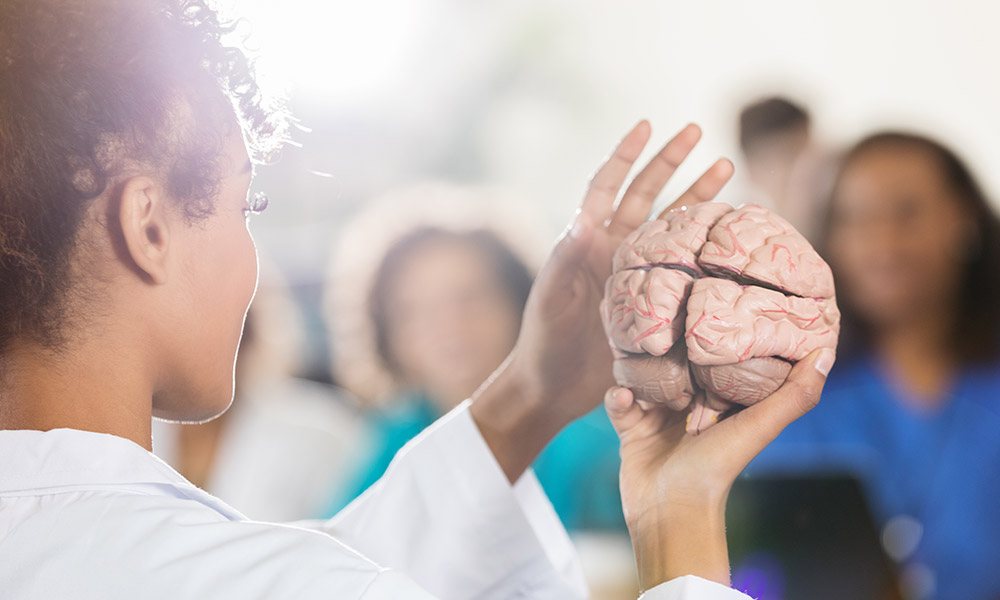
New UBCO research asserts that more neuroscience literacy in the general population will result in health fads that are debunked before people invest their money and time.
With the holiday season fast approaching, many people may already be thinking of new resolutions to live a healthier lifestyle come 2022.
Elijah Haynes is a research assistant at UBC Okanagan’s School of Health and Exercise Sciences. He cautions jumping on the bandwagon of any new health trend or fad diet. Haynes, who researches neuroscience literacy, believes that if more people had access to scientific knowledge, new fads would be debunked before people invest their money and time.
Haynes talks about his recently published article in Advances in Physiology Education that discusses the need to improve neuroscience literacy, and how doing so might save lives.
What led to this particular research subject?
Working as an outreach educator for UBC Okanagan’s iSTAND program, I had many opportunities to teach a range of learners—preschoolers, retirees and everyone in between. While we provided activities for a number of different sciences, the neuroscience activities tended to be the most popular across all age groups. The neuroscience events also produced the most interesting discussions about the potential applications of science. I wrote the article hoping to make other physiologists and neuroscientists aware that there is a demand for neuroscience knowledge, and also highlight ways they can provide it.
How did you become interested in neuroscience, and concerned for neuroscience literacy?
I was training as a high school football player and I noticed how different strength coaches would talk about the neuroscience of getting stronger. I watched YouTube videos to learn more about how the nervous system controls movement and was so fascinated that I opted to pursue undergrad and graduate studies in kinesiology.
My experience as an outreach educator made it apparent that a lot of neuroscience research is misunderstood. Given the implications of neuroscience research, I became concerned that public misunderstanding of neuroscience might lead to its misapplication. Without sufficient public understanding, society won’t be able to effectively use the knowledge gained from neuroscience research.
What needs to be done to improve science literacy in our community?
Canadians are lucky in that we have a vast supply of highly educated people living here—everyone knows something about something. At the same time, people are hungry for knowledge about how the world works. Not only does scientific knowledge need to be accessible, but science-literate people should also be available to ensure that knowledge is appropriately understood.
People should also have opportunities to see science “behind the scenes.” It would be phenomenal if universities and colleges designated spaces on campus for regular community engagement events and exhibits. One of the contributors to misinformation spread is distrust. There is a perception that scientists are simply elites protected from public scrutiny by institutions and government. If citizens felt that research was something they could see for themselves, they might be more receptive to knowledge gained by science.
What role does enhanced science literacy play in contemporary health issues?
Many health disorders in Canada are related to modern lifestyles. People are living longer, residing in increasingly denser communities, have access to more food and fewer physical activity requirements than ever before. While culture and societal norms play a big role in determining how we behave in our current environment, empirical knowledge about the way our bodies, especially our nervous systems, will help people make decisions on how to live healthier lives.
I think most people are aware that health trends and diet fads exist, yet every year new ones rise as soon as the last ones are debunked. Quite frankly, it’s sad seeing people spend hard-earned money on these products and services. It’s my hope that greater science literacy will prevent these fads and trends from gaining popularity.
How can people use science to avoid falling for health fads?
People should know that science is more than just memorized facts and showy demonstrations. Science is a process that generates knowledge. We can apply that process to anything we want to know more about. It starts by asking a question, and proceeds by determining the best way to find an answer. In science, how a question is answered is often more important than the answer itself.
When it comes to health fads, people should consider multiple sources of evidence. Instead of just seeking information that promotes a new lifestyle routine, try looking for information to debunk that lifestyle routine.
So, improving science literacy can lead to healthier lifestyles?
Whether we’re talking about health or any other science-related topic, engaging with others is the best way to broaden our understanding. We’ve seen many examples of science driving people apart over the last few years. By acknowledging that people approach, learning from a diverse array of backgrounds and then working together to improve our collective understanding, science can actually be a means of bringing people closer together. When this happens, science does more than just teach us about the world. Science creates connections between people. And those connections can create a healthy, thriving community.